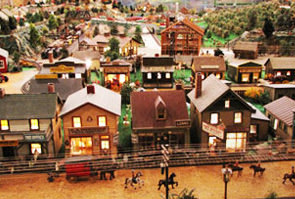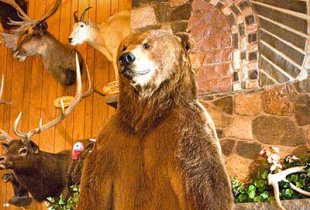• The most popular name for a dog is Max.
• An estimated 1 million dogs in the United States have been named the primary beneficiary in their owner's will.
• Ever wonder why a dog would go in circles before laying down? Pet dogs will circle anywhere indoors, even in their own beds. It's not reasoned behavior, but is instinctive to all canines, domesticated and wild. Dogs in the wild would encircle where they laid-down to be sure that there were no snakes or other enemies and also, it was part of the ritual of make a good resting place (tamping down the ground before they laid down.)
Dogs would also circle before laying down to find what they think is the most comfortable position. Most dogs don't like to lay on a flat surface, that is why they sometimes paw at the same area before laying. A common theory is that in the wild dogs will choose to sleep with their nose blowing into the prevailing wind. That being said, they circle to figure out which way that is. One contradiction to this is a sled dog which will often pad out a circle in the snow and sleep with the wind blowing from back to front so as to stay warm. Dogs circle to mark their scent so they can find that place again.
• Contrary to popular belief, dogs do not sweat by salivating. They sweat through the pads of their feet.
• Dogs are mentioned 14 times in the Bible.
• The dachshund is one of the oldest dog breeds in history (dating back to ancient Egypt.) The name comes from one of its earliest uses - hunting badgers. In German, Dachs means "badger," Hund is "hound."
• Every year, $1.8 billion is spent on pet food. This is four times the amount spent on baby food.
• French poodles did not originate in France.
• Inbreeding causes 3 out of every 10 Dalmatian dogs to suffer from hearing disability.
• It has been established that people who own pets live longer, have less stress, and have fewer heart attacks.
• Scientists have discovered that dogs can smell the presence of cancer in humans
• Seventy percent of people sign their pet's name on greeting cards and 58 percent include their pets in family and holiday portraits.
• 65 percent of pet owners say they have more photos of their pet than of their spouse or significant other.
• The common belief that dogs are color blind is false. Dogs can see color, but it is not as vivid a color scheme as we see. They distinguish between blue, yellow, and gray, but probably do not see red and green. This is much like our vision at twilight.
• Most pet owners (96 percent) say their pet makes them smile more than once a day.
• The name of the dog from "The Grinch Who Stole Christmas" is Max.
• Chihuahuas are named for the region of Mexico where they were first discovered in the mid-19th century.
• A dog's whiskers are touch-sensitive hairs , they are found on the muzzle, above the eyes and below the jaws, and can actually sense tiny changes in airflow.
• 33 percent of dog owners admit that they talk to their dogs on the phone or leave messages on an answering machine while away.
• Every known dog except the chow has a pink tongue - the chow's tongue is jet black.
• The English Romantic poet Lord Byron was so devastated upon the death of his beloved Newfoundland, whose name was Boatswain, that he had inscribed upon the dog's gravestone the following: "Beauty without vanity, strength without insolence, courage without ferocity, and all the virtues of man without his vices.
dogwork.com/
• An estimated 1 million dogs in the United States have been named the primary beneficiary in their owner's will.
• Ever wonder why a dog would go in circles before laying down? Pet dogs will circle anywhere indoors, even in their own beds. It's not reasoned behavior, but is instinctive to all canines, domesticated and wild. Dogs in the wild would encircle where they laid-down to be sure that there were no snakes or other enemies and also, it was part of the ritual of make a good resting place (tamping down the ground before they laid down.)
Dogs would also circle before laying down to find what they think is the most comfortable position. Most dogs don't like to lay on a flat surface, that is why they sometimes paw at the same area before laying. A common theory is that in the wild dogs will choose to sleep with their nose blowing into the prevailing wind. That being said, they circle to figure out which way that is. One contradiction to this is a sled dog which will often pad out a circle in the snow and sleep with the wind blowing from back to front so as to stay warm. Dogs circle to mark their scent so they can find that place again.
• Contrary to popular belief, dogs do not sweat by salivating. They sweat through the pads of their feet.
• Dogs are mentioned 14 times in the Bible.
• The dachshund is one of the oldest dog breeds in history (dating back to ancient Egypt.) The name comes from one of its earliest uses - hunting badgers. In German, Dachs means "badger," Hund is "hound."
• Every year, $1.8 billion is spent on pet food. This is four times the amount spent on baby food.
• French poodles did not originate in France.
• Inbreeding causes 3 out of every 10 Dalmatian dogs to suffer from hearing disability.
• It has been established that people who own pets live longer, have less stress, and have fewer heart attacks.
• Scientists have discovered that dogs can smell the presence of cancer in humans
• Seventy percent of people sign their pet's name on greeting cards and 58 percent include their pets in family and holiday portraits.
• 65 percent of pet owners say they have more photos of their pet than of their spouse or significant other.
• The common belief that dogs are color blind is false. Dogs can see color, but it is not as vivid a color scheme as we see. They distinguish between blue, yellow, and gray, but probably do not see red and green. This is much like our vision at twilight.
• Most pet owners (96 percent) say their pet makes them smile more than once a day.
• The name of the dog from "The Grinch Who Stole Christmas" is Max.
• Chihuahuas are named for the region of Mexico where they were first discovered in the mid-19th century.
• A dog's whiskers are touch-sensitive hairs , they are found on the muzzle, above the eyes and below the jaws, and can actually sense tiny changes in airflow.
• 33 percent of dog owners admit that they talk to their dogs on the phone or leave messages on an answering machine while away.
• Every known dog except the chow has a pink tongue - the chow's tongue is jet black.
• The English Romantic poet Lord Byron was so devastated upon the death of his beloved Newfoundland, whose name was Boatswain, that he had inscribed upon the dog's gravestone the following: "Beauty without vanity, strength without insolence, courage without ferocity, and all the virtues of man without his vices.
dogwork.com/
















































